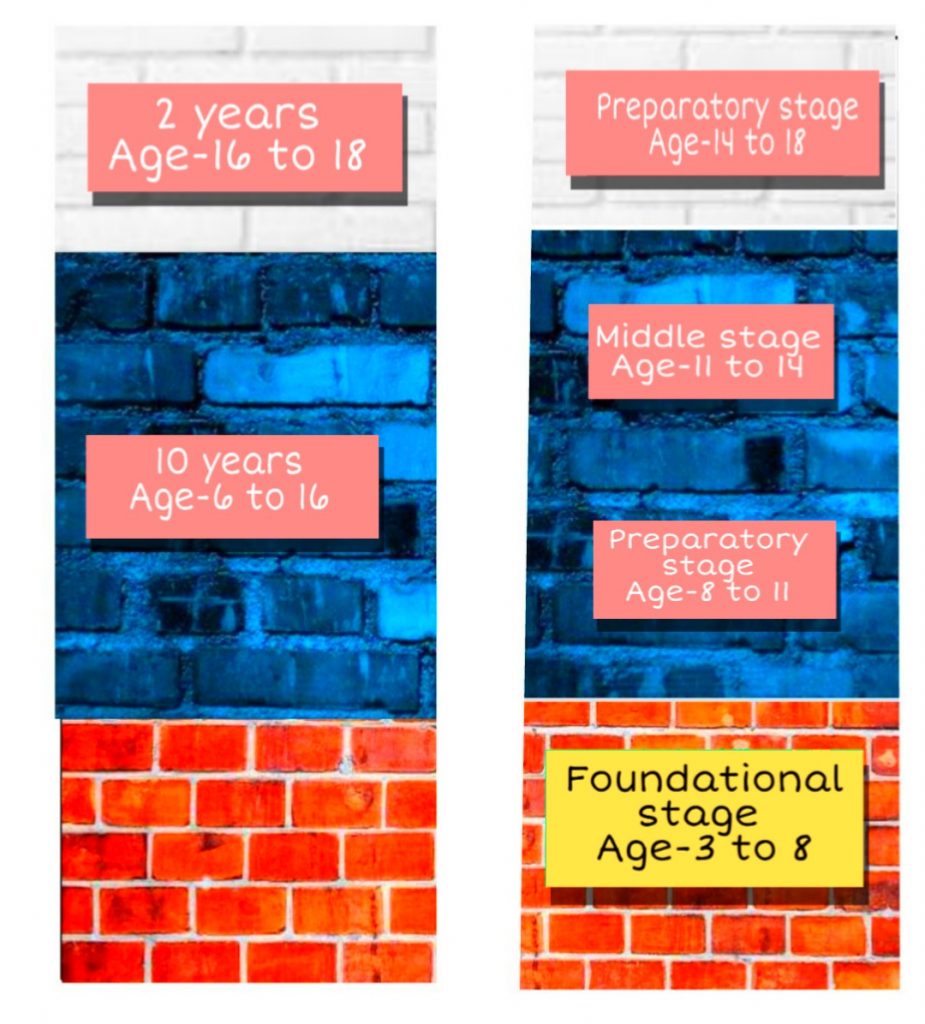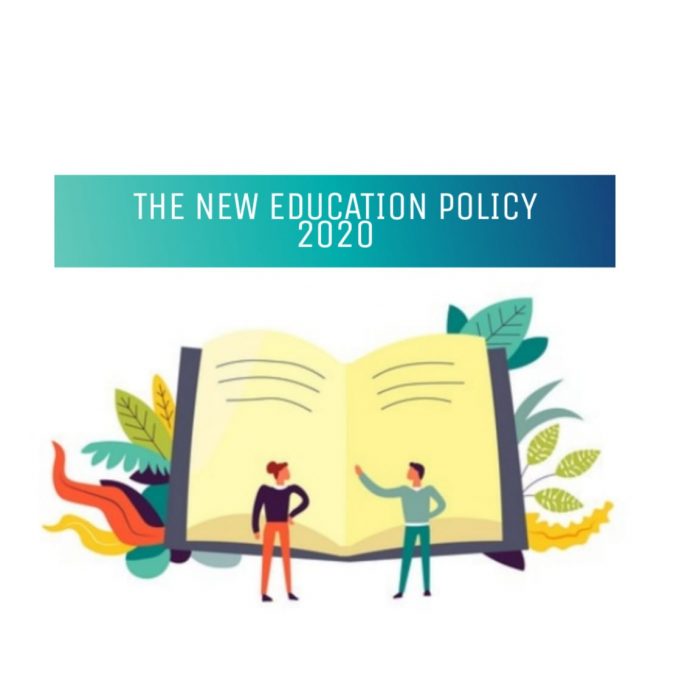It was on 29th July 2020, the educational system existing since 1986, got transformed. The announcement was made by Union ministers for Information and Broadcasting(I&B), Prakash Javedkar, and Human Resource Development (HRD) minister, Ramesh Pokhariyal Nishank. The draft was prepared by a panel of experts and escorted by former ISRO chief- K. Kasturirangan. To bring about the much-needed change in the educational system of India, where students can freely learn out of their interests and capabilities, the 34-year old educational system has been replaced by the new national education policy to meet this need. This system meets the requirements of the present generation and is aiming for upgrading the quality of education and bringing more flexibility to the students and teachers.

Previously, affording education was hardly possible by everyone, hence a large part of our society got deprived of quality education especially talking about the remote and rural areas. With the introduction of the new education policy, each one will get equal access to education and will achieve full human potential. The aim is to bridge the gap between the existing education system being followed and what is required to be followed so that equity, quality, and integrity can be mainstreamed. Increased emphasis is on conceptual learning rather than rote learning, with developing the creative potential of every individual. The major development has been taken care of on the Right of children to free and compulsory education which was laid down in the year 2009. The elimination of ‘coaching culture’ and the promotion of regular formative assessment will be prioritized.
Understanding the four stages:

Besides ensuring 100% gross enrollment ratio in school education by the year 2030, NEP is also looking forward to a universal approach for all levels of schooling right from foundation stage to secondary level i.e., grade 12. The changes made are as follows covering the four stages:
- Foundation level-It includes children aging from 3 to 8 years. This level is split into two parts i.e., the first three years will be pre-schooling or Anganwadi and the next two years will include primary school level i.e., grades 1-2.
- Preparatory level- This level will include children of age group 8 to 11 and will comprise of classes 3 to 5.
- Middle level- Children of classes 5 to 8 and of age 11 to 14 will come under the middle stage of schooling.
- Secondary level- It is split up into two parts. Classes 9 to 10 in the first phase and 11 to 12 in the second, covering children of age group 14-18.
More emphasis is given to early childhood education to ensure the quality of education at the preliminary stage. Students have the freedom to choose their paths according to their interests and capabilities. Equal emphasis is given to all courses of science, social science, mathematics, arts, and sports.
Ease of language

The students will get access to their mother language or local language till grade 5, and preferably till 8th grade or beyond so that the medium of instruction is made easy and understanding becomes more suitable.
There will be more options to the students for learning foreign languages which was most commonly limited up to German and French. Languages such as Thai, Korean, Japanese, Portuguese, and Russian will now be introduced to students of secondary level. Sanskrit will be made compulsory at all levels of school and will be taken as an important complementary option. Classical languages such as Oria, Prakrit, Tamil, Telugu, Malayalam, and Pali will also be made available as an option for students.
Special arrangements for students with hearing impairment have been also taken care of by implementing Indian Sign Language (ISL).
P.A.R.A.K.H

Performance, Assessment, Review, and Analysis of Knowledge and Holistic development is what PARAKH stands for. This will be now the new assessment body and will be responsible for setting up rules and guidelines for student evaluation.
For classes 10 and 12, board examinations will continue and students will be given the freedom to take their board exam in any schooling year, one for the main board exam and the other for their improvement. Emphasis will be on making the educational approach easy and also encouraging the core potential of the student.
For boosting the extracurricular activities among students, the school authorities will be encouraged to set up Bal Bhavans, so that students participate in art, sports, and various fields. This helps in diversifying the young minds and getting them connected to what makes them feel happy and interested in and hence, choosing their career path.
Interdisciplinary College Education
The system has ensured a holistic and better interdisciplinary system of education for students at the undergraduate level. Underlining the high-quality support systems, the government has also stressed upon funding of resources adequately to the socio-economically weak background. Attention to the mental health of students is also prioritized by making the availability of more number of counselors in every field, right from professional and career-related to physical and psychological counselors.
- The undergraduate degree course of three to four years will now have the option for multiple exits at any point during the whole course process. The students will not be deprived of certificate and recognition and will be provided a certificate if completed one year in their course. A diploma will be provided if a student leaves the course after two years and a full degree certificate on completion of the whole course without making any exit in between. So, overall i.t’s a relief to students as their time and money will not get wasted if they need to leave the course for any personal reason.
- To establish a high standard of education all over India, M.E.R.U. which stands for Multi-disciplinary Education and Research University will be set up. The aim is to achieve a comprehensive and multidisciplinary education.
- NRF which stands for- National Research Foundation will take care of research and innovation in India and will also fund the researches in all fields.
Headway to Online Education

For not letting education to get hindered due to any situation which makes children not attend schools, a very strong online base needs to be set up. So, the government has put forth, set of recommendations to foster online education as an alternative in the future to combat any situation that will obstruct the in-person approach of education.
Higher Education Commission of India (HECI)

All UGC, AICTE, and NCTE will now come under HECI and not function as individual bodies. The medical and legal education will be excluded from this branch and will continue working as a separate body. Also, public and private institutions will work under the same set of rules and regulations set up by HECI.
Adult education has been stressed upon to achieve 100% youth literacy by the year 2030. Previously, equal importance to all subjects was not given and in that process, students had to choose out of some pressure or would not feel the freedom to choose according to their interests. Now, there won’t be any fixed choices and students can choose across their streams. No barriers and limited choices will be made in vocational and academic courses, and between curricular and non-curricular activities. The introduction of vocational courses will start from sixth grade itself and will also include an internship. The burden has been reduced immensely and freedom of choice will help students select their career paths wisely.
Overall, the stake is very responsible enough and is focused on making India more literate and enhancing the quality of education. If the implementation is successful, then possibly India can come at par with countries having a better literacy rate. This step is very important to eliminate the factors hindering the freedom of choice of students which is putting a great overall effect on employment factors as well.

Ur vocabulary is excellent..
Keep it up..